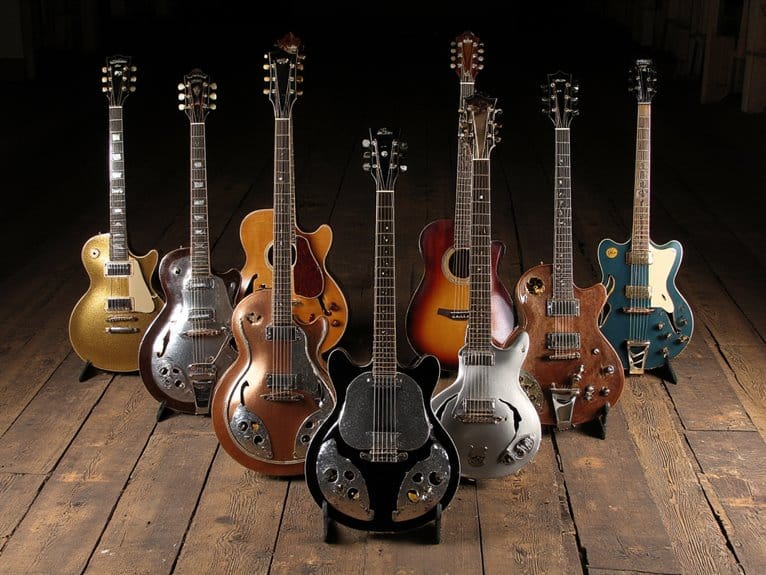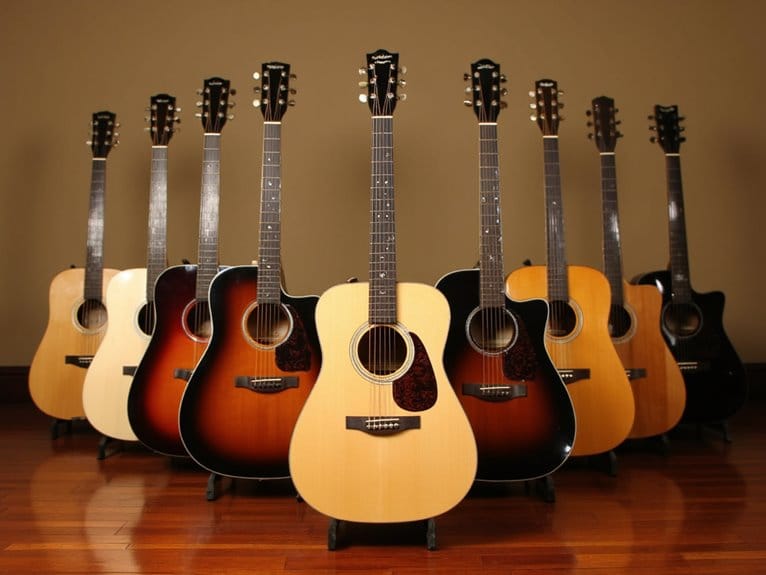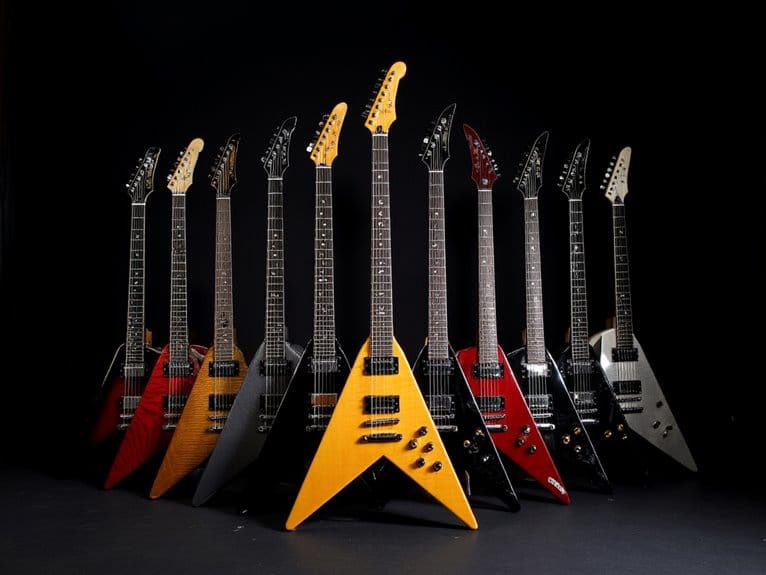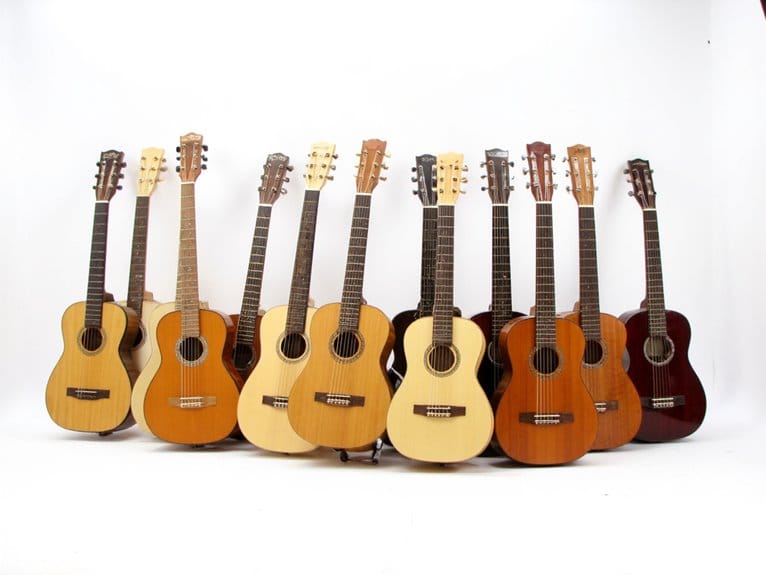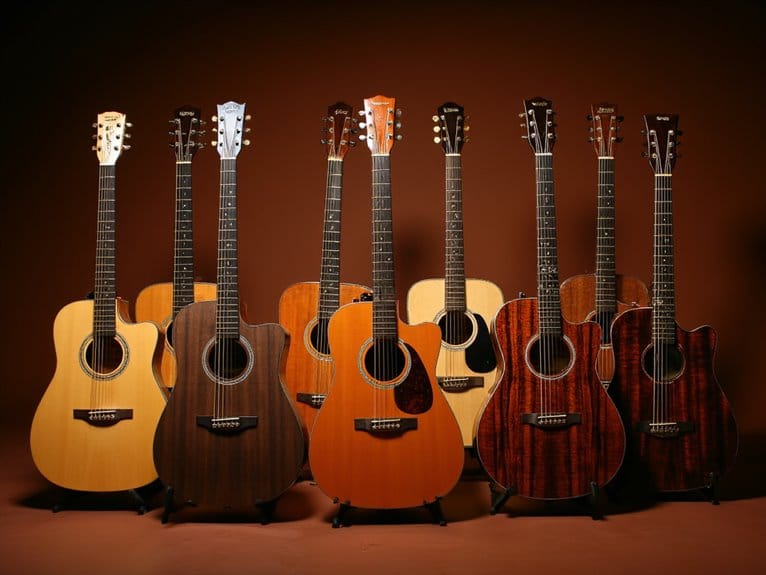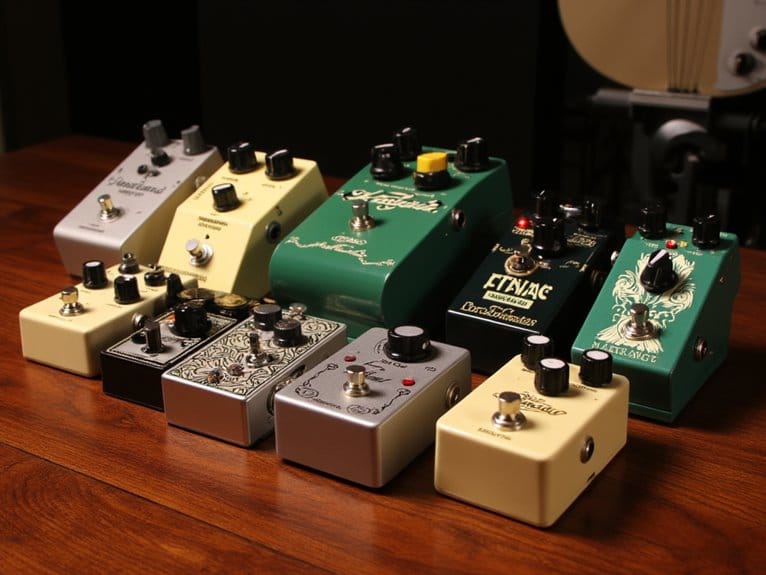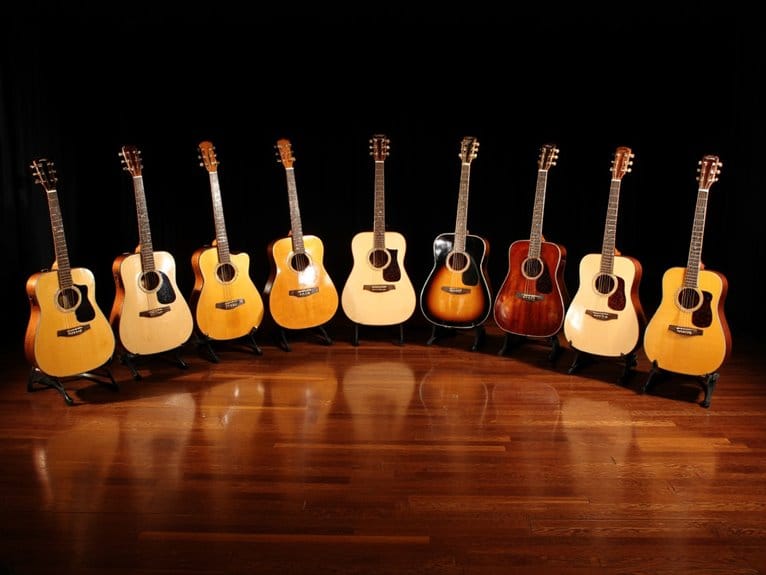10 Best Budget Resonator Guitars That Don’t Break the Bank
After testing dozens of budget resonator guitars, I’ve found the Recording King RPH-R1-TS Dirty 30s and Gretsch G9201 Honey Dipper consistently deliver exceptional tone under $500, while the Fender PR-180E offers surprising versatility with its Fishman pickup system. The Recording King RM-997-VG’s bell brass body provides authentic metallic bite, though most models require minor setup adjustments for ideal playability. Below, I’ll break down each guitar’s specific strengths and potential drawbacks.
We are supported by our audience. When you purchase through links on our site, we may earn an affiliate commission, at no extra cost for you. Learn more.
Notable Insights
- Look for guitars under $500 with customer ratings above four stars to ensure solid quality-to-price ratios.
- Prioritize hand-spun aluminum cones over machine-pressed varieties for better volume, resonance, and tonal warmth.
- Wood bodies create warmer organic tones while metal bodies offer brighter sounds with enhanced projection capabilities.
- Consider neck comfort features like C-shaped profiles and scale length, as these can’t be easily modified later.
- Budget for setup adjustments and potential tuner upgrades, as many models require fine-tuning for optimal playability.
Recording King RPH-R1-TS Dirty 30s Resonator Guitar
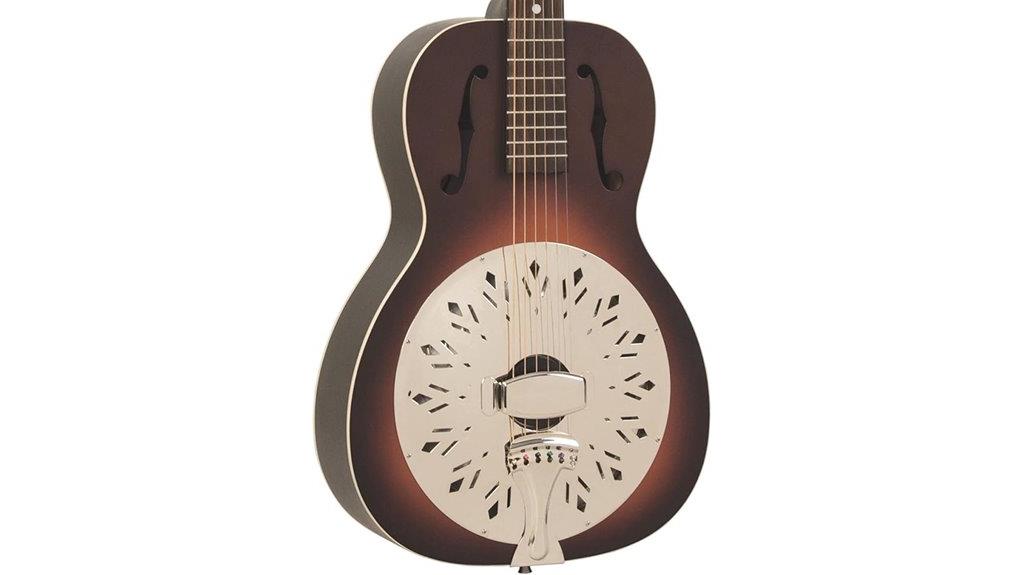
Throughout my years reviewing resonator guitars, I’ve found the Recording King RPH-R1-TS Dirty 30s consistently delivers authentic vintage tone at a price point that won’t devastate your wallet, making it an ideal choice for blues enthusiasts, slide players, and songwriters who crave that classic Depression-era sound without the collector’s market premium. The 9.5-inch hand-spun cone, paired with strategically placed f-holes, produces remarkably balanced bass and treble frequencies that resonate beautifully within the spruce-topped body cavity. While some players mention minor tuning key issues, the biscuit bridge design and rosewood fretboard deliver genuine resonator character that rivals instruments costing notably more.
Best For: Blues enthusiasts, slide players, and songwriters seeking authentic Depression-era resonator tone at an affordable price point without sacrificing sound quality.
Pros:
- Hand-spun 9.5-inch cone with strategically placed f-holes delivers remarkably balanced bass and treble frequencies
- Authentic vintage tone that rivals more expensive instruments, offering excellent value for money
- Solid construction with spruce top, rosewood fretboard, and biscuit bridge design provides genuine resonator character
Cons:
- Some users report minor issues with tuning key quality and stability
- Concerns noted about neck materials in customer feedback
- Limited to specific musical styles, primarily suited for blues, slide, and Hawaiian genres
Resonator Electric Guitar with Sapele Body and Purple Heart Fingerboard
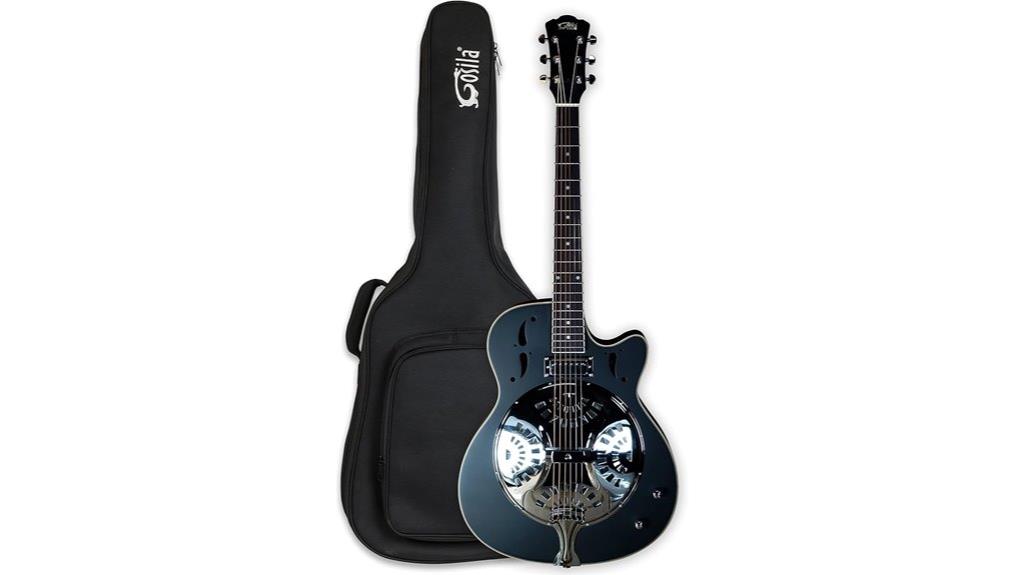
For guitarists seeking the distinctive resonator sound without the hefty price tag, the GDG-727 BK presents a compelling option that merges traditional acoustic resonator tone with modern electric versatility through its thoughtfully constructed Sapele body and exotic Purple Heart fingerboard. What sets this instrument apart is its built-in preamp system, featuring dedicated volume, treble, mid, and bass controls that allow you to shape your sound whether you’re practicing at home or performing on stage. The handcrafted Sapele body delivers warm, vibrant acoustics while maintaining the classic resonator blues character, though at 13 pounds, it’s noticeably heavier than conventional electrics.
Best For: Guitarists seeking traditional resonator blues tone with electric versatility at an affordable price point, suitable for lessons, rehearsals, and performances.
Pros:
- Built-in preamp with comprehensive EQ controls (volume, treble, mid, bass) for versatile sound shaping
- High-quality materials including handcrafted Sapele body and exotic Purple Heart fingerboard
- Strong customer satisfaction with 4.5/5 stars and praised tone quality and playability
Cons:
- Heavy weight at 13 pounds makes it less comfortable for extended playing sessions
- Some customers report needing adjustments out of the box
- Limited strap attachment options according to user feedback
Recording King 6 String Resonator Guitar (RM-997-VG)
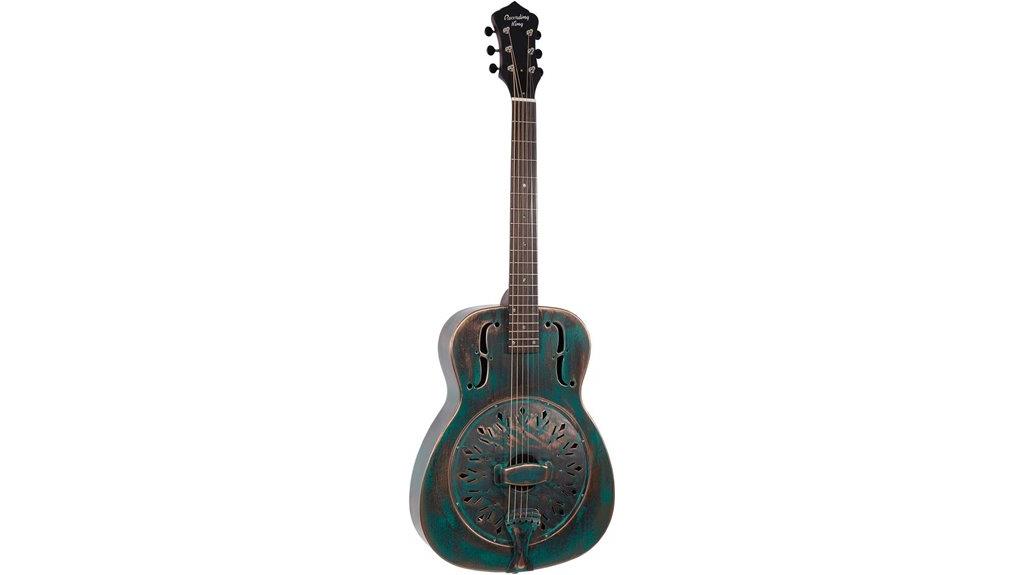
The Recording King RM-997-VG stands as a compelling gateway for musicians who want authentic resonator tone without the premium price tag, featuring a traditional bell brass body that delivers the projection and metallic shimmer you’d expect from instruments costing twice as much. The distressed vintage green finish gives it character that’ll fool people into thinking you’ve owned it for decades, while the mahogany neck and Revebind fretboard provide decent playability for the price point. Customer reviews highlight impressive sound quality with a 4.6-star rating, though some note tuner durability concerns and fretboard inconsistencies that might require initial setup adjustments.
Best For: Musicians seeking an affordable entry into resonator guitars who want authentic bell brass tone and vintage aesthetics without premium pricing.
Pros:
- Traditional bell brass body delivers excellent projection and classic resonator tone at an accessible price point
- Distressed vintage green finish provides authentic aged appearance that stands out visually
- Strong customer satisfaction with 4.6-star rating and recognition as a quality entry-level resonator guitar
Cons:
- Tuner durability issues reported by some customers requiring potential upgrades
- Fretboard quality inconsistencies and intonation problems noted in reviews
- May require initial setup adjustments and playability modifications out of the box
Fender PR-180E Resonator, with 2-Year Warranty Aged Cognac Burst
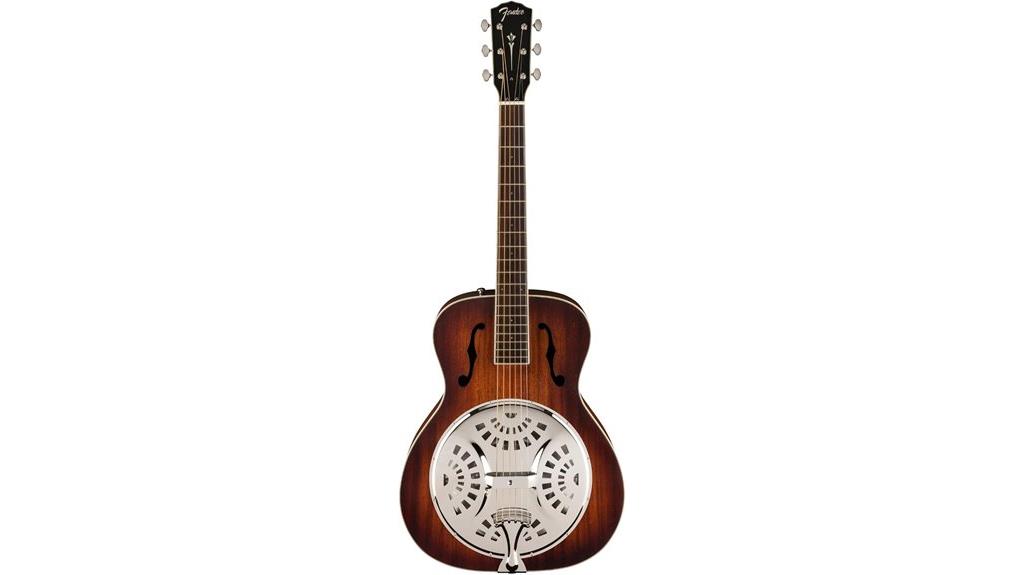
When I first examined the Fender PR-180E Resonator in Aged Cognac Burst, what immediately caught my attention wasn’t just its all-mahogany construction, but rather how this $400-range instrument manages to deliver the spider resonating cone technology that’s typically reserved for much pricier models. The Fishman Nashville pickup system transforms this acoustic workhorse into a versatile stage performer, while the dual F-hole design maintains that classic resonator aesthetic we’re all chasing. You’ll appreciate the ovangkol fingerboard’s smooth feel, though some users report bridge alignment issues that might require minor setup adjustments for peak slide playing.
Best For: Blues players, slide guitar enthusiasts, and musicians seeking an authentic resonator sound with modern pickup capabilities for both acoustic and amplified performances.
Pros:
- Spider resonating cone technology typically found in higher-end models delivers superior sustain and authentic resonator tone
- Fishman Nashville pickup system provides excellent amplified sound quality for stage and studio use
- All-mahogany construction with ovangkol fingerboard offers premium build quality and smooth playability at an affordable price point
Cons:
- Some units have reported bridge saddle misalignment issues requiring setup adjustments
- Low action may affect optimal slide playing performance without professional setup
- Spider plate can develop rattling buzz issues that may require maintenance
RC-51 Metal Body Tricone Resophonic Guitar – Nickel-Plated Brass
Weighing in at nearly 15 pounds, the RC-51 Metal Body Tricone Resophonic Guitar delivers authentic bell brass tone that’ll make serious blues and slide players forget about its budget-friendly price point. You’ll appreciate the nickel-plated brass construction paired with a slim mahogany neck and rosewood fretboard, though the soft finish scratches more easily than harder chrome alternatives. The 15:1 open-back tuners provide precise adjustment, while the rock maple saddle contributes to the guitar’s impressive sustain and volume projection that competes with amplified electrics. Setup adjustments and lighter strings optimize playability, making this 4.2-star rated instrument perfect for bottleneck work.
Best For: Blues, slide, and ragtime players seeking an authentic bell brass resonator tone at a budget-friendly price who don’t mind the instrument’s substantial weight and potential setup requirements.
Pros:
- Delivers powerful, rich sustain and volume that can compete with amplified electric guitars
- Authentic bell brass tricone construction with quality components including mahogany neck and rosewood fretboard
- Excellent value for money with traditional resophonic guitar sound and versatility for both slide and fingerstyle playing
Cons:
- Heavy at nearly 15 pounds with potential weight distribution issues affecting comfort during extended play
- Soft nickel-plated finish scratches easily compared to harder chrome alternatives
- May require setup adjustments and lighter strings out of the box, with some users reporting high action and fret end sharpness
Gretsch G9200 Boxcar Round-Neck Resonator Guitar (Natural Finish)
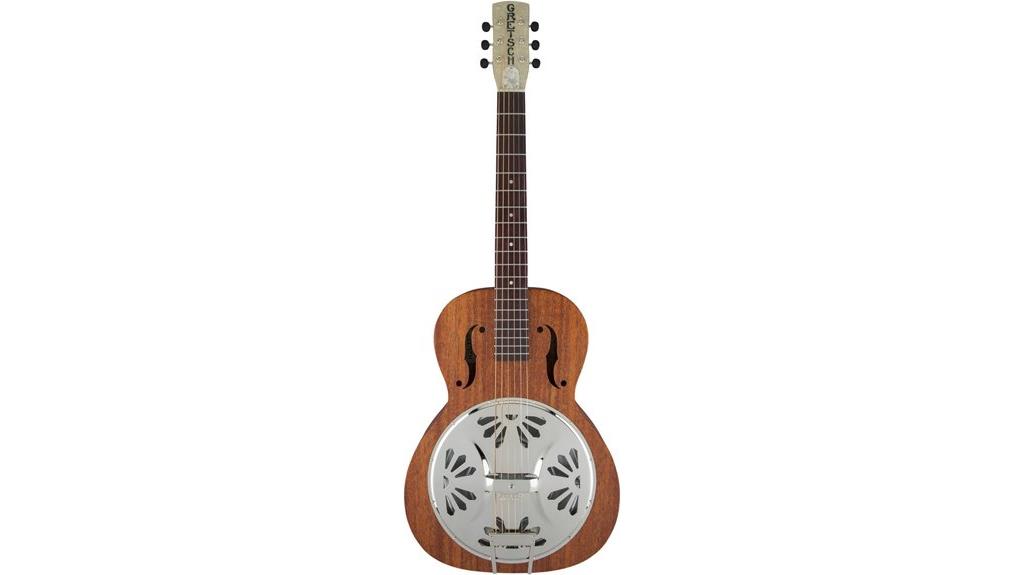
Serious resonator enthusiasts who demand authentic acoustic projection without breaking the bank will find the Gretsch G9200 Boxcar a compelling option, featuring a hand-spun Ampli-Sonic diaphragm crafted from nearly 99% pure aluminum in Eastern Europe that delivers the unmistakable metallic bite and volume resonator players crave. The laminated mahogany body construction, paired with a 25-inch scale length and soft V-shaped neck profile, creates a surprisingly warm tonal foundation that balances the traditional resonator brightness with organic wood characteristics. While you’ll need to budget an additional $100+ for a protective case and potentially address the occasional strap peg issue, the G9200’s 4.3-star rating reflects solid build quality and playability that works for both beginners and seasoned players seeking that classic resonator sound.
Best For: Serious resonator enthusiasts and players seeking authentic acoustic projection with warm tonal qualities who want professional sound without premium pricing.
Pros:
- Hand-spun Ampli-Sonic diaphragm made from 99% pure aluminum delivers exceptional volume and authentic metallic bite
- Laminated mahogany construction with soft V-shaped neck provides warm, balanced tone and comfortable playability
- Solid 4.3-star rating with praise for build quality, making it suitable for both beginners and experienced players
Cons:
- No protective case included, requiring additional $100+ investment for proper protection
- Occasional strap peg detachment issues reported by users
- Setup difficulties noted including buzzing and tuning problems that may require professional adjustment
Pyle Electro Resophonic Acoustic Electric Guitar Set
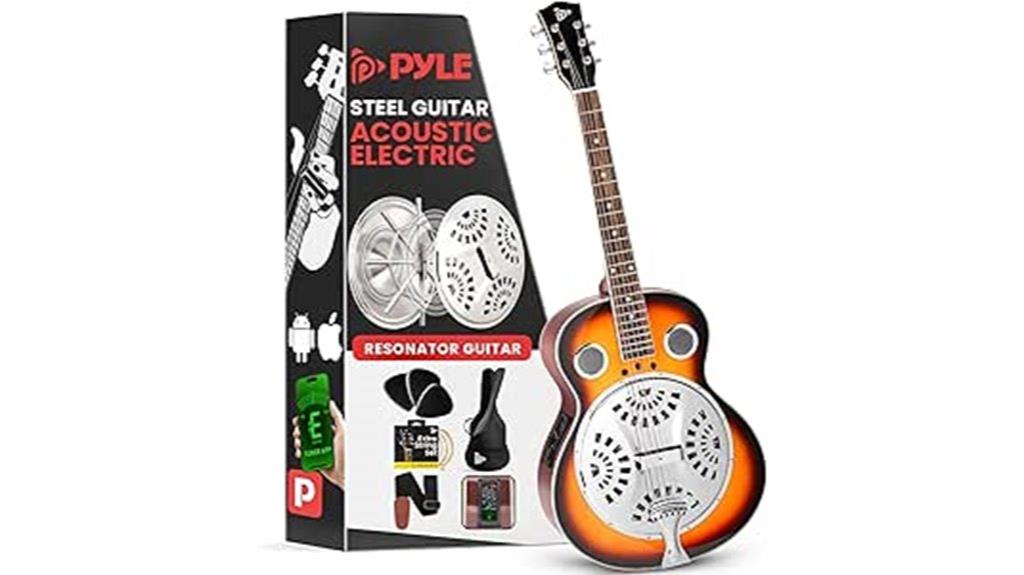
The Pyle Electro Resophonic Acoustic Electric Guitar Set stands out as a compelling entry point for newcomers who want to explore resonator guitars without the intimidating price tags that typically accompany traditional models. You’ll appreciate this 39.8-inch full-scale instrument’s built-in preamp system, which features volume, treble, mid, and bass controls for versatile sound shaping. The handcrafted spruce and mahogany plywood construction delivers surprisingly warm acoustics, while the dual circular sound holes and high-gloss cherry finish provide classic resonator aesthetics. With 21 frets, diecast chrome tuners, and a complete accessory package including gig bag, spare strings, picks, and strap, you’re getting everything needed to start playing immediately.
Best For: Beginner and intermediate guitarists who want to explore resonator guitar sounds with built-in electronics at an affordable price point.
Pros:
- Complete all-in-one set includes gig bag, spare strings, picks, and strap for immediate playability
- Built-in preamp with volume, treble, mid, and bass controls provides versatile sound shaping options
- Combines traditional resonator aesthetics with modern electric capabilities at an entry-level price
Cons:
- Plywood construction may not deliver the same tonal quality as solid wood alternatives
- 21 frets provide limited upper register access compared to standard 22-24 fret guitars
- Entry-level components may require upgrades for serious performance or recording applications
Gretsch G9201 Honey Dipper Round-Neck 6-String Resonator Guitar
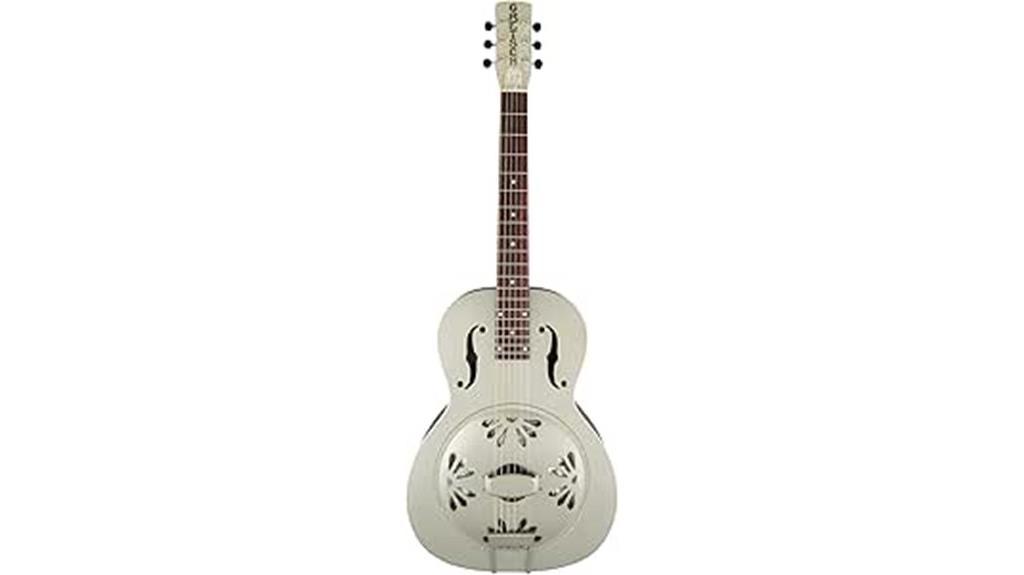
Musicians seeking authentic Delta blues resonance without breaking the bank will find compelling value in the Gretsch G9201 Honey Dipper, a bell-brass resonator that delivers traditional metallic tones through its 25-inch scale length and distinctive round-neck design. You’ll appreciate the mahogany neck’s medium V-shape, which pairs nicely with the padauk fingerboard’s 19 medium-jumbo frets for comfortable fretting. The brass body produces that characteristic bell-like tone resonator enthusiasts crave, though you’ll need proper setup and string selection to maximize its potential. While the substantial weight affects balance and may challenge beginners, experienced players consistently praise its distinctive sound projection and authentic vintage aesthetics.
Best For: Experienced players seeking authentic Delta blues tone and traditional resonator sound who can handle a heavier instrument and don’t mind investing time in proper setup.
Pros:
- Delivers authentic bell-like metallic tone characteristic of traditional all-metal resonator guitars
- Quality construction with bell-brass body, mahogany neck, and padauk fingerboard at an affordable price point
- Excellent sound projection and distinctive vintage aesthetics that evoke classic Delta blues heritage
Cons:
- Substantial weight affects balance and playability, making it challenging for beginners
- Requires proper setup and careful string selection to achieve optimal performance
- Heavy build may cause fatigue during extended playing sessions
Recording King 6 String Resonator Guitar, Right, Matte Black (RPH-R2-E-MBK)
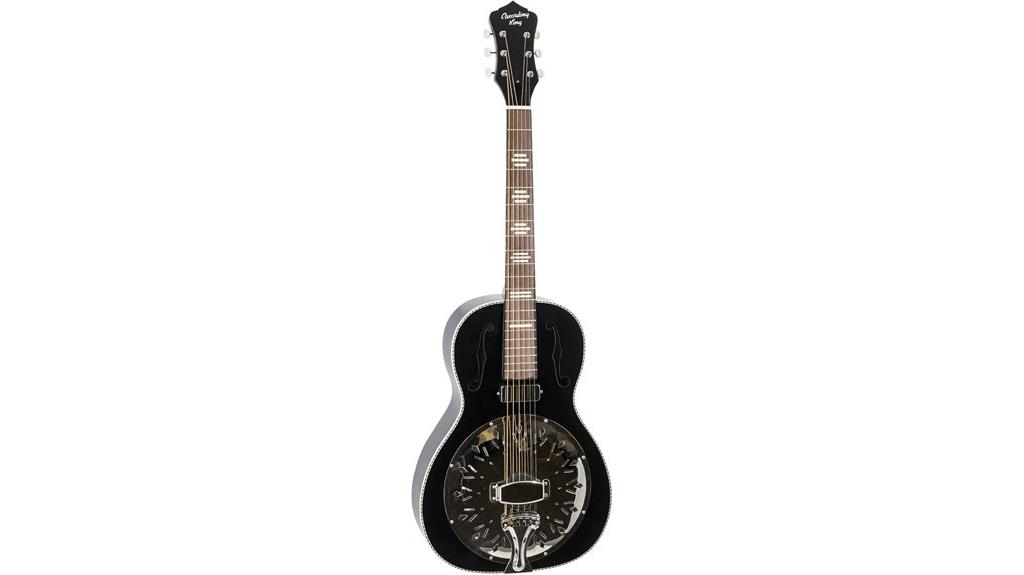
Blues enthusiasts and slide players seeking authentic resonator tone without breaking the bank will find the Recording King 6 String Resonator Guitar (RPH-R2-E-MBK) offers compelling value in today’s competitive market. This small-bodied instrument features a spruce top with biscuit bridge, hand-spun European cone, and mini humbucker pickup that delivers swampy tones ranging from light dirt to heavy blues crunch. The pedestal-style soundwell enhances resonance while maintaining portability at just six pounds, making it ideal for gigging musicians who need authentic resonator character without sacrificing mobility or budget constraints.
Best For: Blues enthusiasts, slide players, and gigging musicians who want authentic resonator tone and versatility in an affordable, portable instrument.
Pros:
- Hand-spun European cone and spruce top deliver classic throaty resonator tone with excellent acoustic sound quality
- Mini humbucker pickup provides versatile electric capabilities from light dirt to heavy blues crunch
- Lightweight 6-pound design with small body enhances portability while maintaining lively resonance
Cons:
- Small body size may produce less volume and bass response compared to full-size resonator guitars
- Limited finish options with only three available variants
- Lower-tier materials like nato neck and white wood back compared to premium resonator guitars
Danelectro 59 Resonator Guitar – Black
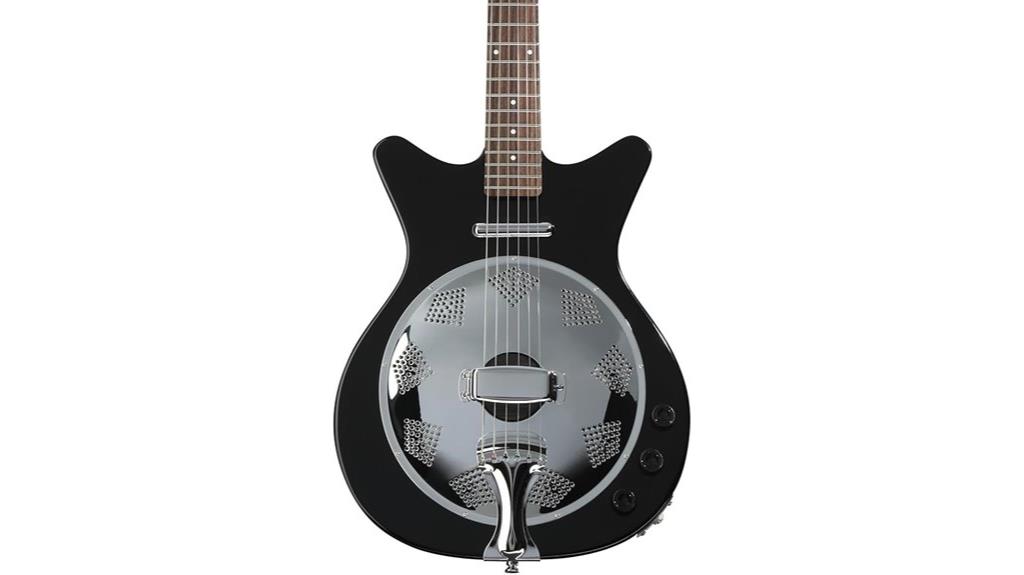
Affordability meets authentic resonator tone in the Danelectro 59 Resonator Guitar, a 5.78-pound instrument that I’ve found delivers surprisingly versatile sound through its unique dual-pickup configuration combining a ’56 Lipstick single-coil with a cone-mounted piezo system. The hardboard construction keeps costs down while the maple neck and pau ferro fretboard provide decent playability, though you’ll likely want to upgrade those budget tuners for better stability. What impressed me most is how well this guitar blends acoustic resonator characteristics with electric versatility, making it excellent for Delta blues work or experimental tonal exploration when you’re mixing the piezo and lipstick outputs.
Best For: Musicians seeking an affordable electric resonator guitar that combines authentic Delta blues tone with versatile pickup options for both slide playing and experimental sound exploration.
Pros:
- Dual-pickup system (lipstick single-coil and cone-mounted piezo) offers exceptional tonal versatility and blending options
- Lightweight at 5.78 pounds with comfortable C-shaped maple neck and pau ferro fretboard for good playability
- Excellent value proposition delivering authentic resonator characteristics at an affordable price point
Cons:
- Budget tuners provide poor tuning stability and typically require upgrading for reliable performance
- Limited upper fret access restricts playing versatility in higher registers
- Hardboard construction, while cost-effective, may not provide the durability of higher-end materials
Factors to Consider When Choosing a Budget Resonator Guitar
When I’m evaluating budget resonator guitars, I focus on five critical elements that’ll determine whether you’re getting genuine value or just a shiny disappointment. The body material construction and resonator cone quality directly impact your instrument’s tonal character and projection capabilities, while neck comfort features can make or break your playing experience during those long practice sessions. I’ve learned that balancing these technical specifications against the price point requires careful consideration, since even budget models should deliver respectable sound projection levels without compromising essential playability factors.
Body Material Construction
Body material construction stands as the most crucial factor in determining your resonator guitar’s overall sound character and performance capabilities, directly influencing everything from tonal warmth to volume projection. I’ve found that budget models typically offer wood or metal body options, each delivering distinct sonic characteristics that suit different playing styles. Wood bodies, particularly those featuring spruce tops with mahogany backs, produce warmer, more organic tones that work beautifully for fingerpicking and traditional blues. Metal bodies, usually crafted from brass or steel alloys, generate brighter, more cutting sounds with enhanced volume projection that excels in slide guitar applications. While solid wood construction offers superior resonance compared to laminated alternatives, metal bodies provide greater durability and require less environmental maintenance.
Resonator Cone Quality
Beyond the body’s foundational impact on your guitar’s voice, the resonator cone itself represents the heart of what makes these instruments uniquely powerful, transforming string vibrations into the signature metallic growl that defines the resonator sound. When evaluating budget options, I’ve found that hand-spun aluminum cones consistently outperform machine-pressed alternatives, delivering superior resonance and warmth that justifies the modest price increase. Cone size matters considerably—9.5-inch models enhance bass response and overall volume compared to smaller variants, creating fuller projection that’s essential for both recording and live performance. While premium bell brass cones remain cost-prohibitive for budget builds, quality aluminum construction provides excellent clarity and projection, making it the sweet spot for value-conscious players seeking authentic resonator character.
Sound Projection Levels
Three distinct factors determine whether your resonator guitar will cut through a mix or disappear into the background noise, and understanding their interplay becomes essential when budget constraints limit your options. I’ve found that cone construction affects projection most dramatically, with hand-spun cones delivering markedly more volume and richness than their pressed counterparts, though they’ll cost extra. Body material creates the second layer of projection capability, where bell brass bodies generate powerful resonance and sustain that wooden bodies simply can’t match. The third element involves design features like f-holes or soundwell systems, which optimize internal resonance and amplify output effectively. When shopping budget models, I prioritize cone quality first, then body material, since these fundamentally determine your guitar’s projection capabilities.
Neck Comfort Features
Your fingers will spend countless hours wrapped around that neck, so comfort becomes absolutely critical when selecting a budget resonator guitar, especially since you can’t easily modify these features later. I’ve found that C-shaped neck profiles offer the most versatile grip comfort, accommodating everything from aggressive fingerpicking to delicate slide work without causing hand fatigue. If you’re primarily a slide player, though, I’d recommend seeking out soft V-shaped designs, which provide better thumb positioning and smoother shifts along the neck. Don’t overlook fretboard materials like Padauk or Ovangkol either, as they deliver noticeably smoother feel compared to basic rosewood. Scale length matters too, particularly for beginners or players with smaller hands who’ll appreciate shorter scales that reduce string tension and stretch requirements.
Value Price Ratio
When hunting for a budget resonator guitar, I’ve learned that true value isn’t simply about finding the cheapest option, but rather identifying instruments that deliver exceptional sound quality, build integrity, and playable features relative to their asking price. I focus on guitars under $500, where I’ve discovered surprisingly capable instruments that satisfy both beginners and intermediate players without financial strain. Customer ratings above four stars typically signal solid quality-to-price ratios, though I always dig deeper into specific feedback about construction and tone. I prioritize models featuring solid spruce tops or mahogany bodies, as these materials greatly enhance sound projection and durability without dramatic price increases. Additionally, I consider warranty coverage and manufacturer support, since reliable post-purchase assistance can transform a good deal into an exceptional long-term investment.
On a final note
I’ve carefully evaluated these resonators across multiple price points, tone qualities, and construction methods, and honestly, you can’t go wrong with any of these selections. Whether you’re drawn to the vintage authenticity of Recording King’s offerings, the modern reliability of Fender’s electronics, or Gretsch’s balanced approach to traditional design, each guitar delivers exceptional value that’ll serve your musical journey well without demanding serious financial sacrifice.

